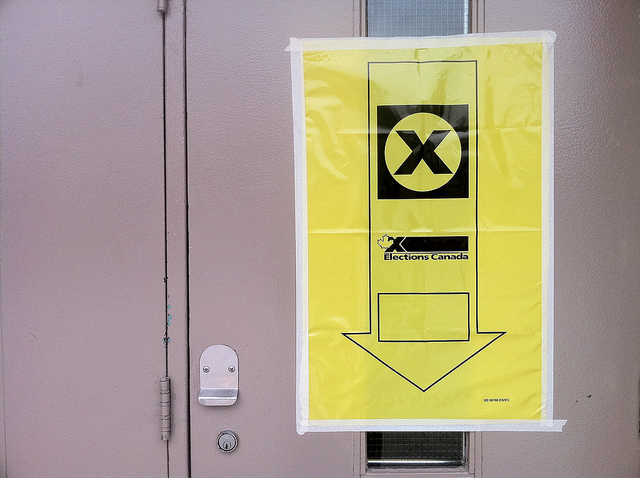The Harper government has introduced a parliamentary bill to boost their chances of winning seats in the next general election. Laughingly entitled the Fair Elections Act, Bill C-23 would legislate advantages for the Conservatives through voter suppression, and curtail the role of Elections Canada in promoting voting — the exercise of the democratic franchise — guaranteed under Section 3 of the Canadian Charter of Rights and Freedoms.
The Act has numerous features buried in nearly 250 pages of text designed to favour the ruling party. Notably, the Conservatives want to fix into law current advantages they have gained over the NDP and the Liberals in raising money from individual donors.
Incredibly, Bill C-23 would remove entirely from election spending limits, party spending for soliciting contributions from any donor who has contributed $20 in the past five years.
If adopted, this measure would allow the Conservatives to spend without limit to recruit funds from past donors, entrenching “first mover advantage” in a domain where in a previous guise (as the Reform Party) they excelled, while the other parties have been slow to catch up.
As well, Bill C-23 would enhance the ability of moneyed donors to contribute to parties by raising the upper limit by $300 (or 25 per cent) to $1,500, and then by $25 a year thereafter.
The Conservatives favour tax deductible contributions because it enables them to act like a political business, seeking funds in the following way: In return for your contribution we will provide you with small government, low taxes and your favourite social conservative policies: gun control, climate change or (fill in the blank according to party donor intelligence).
When the NDP ask for money to promote, say child care, its supporters want to debate the form it would take, not just “buy” support for it.
While the Conservatives flourish recruiting buyers as clients, the NDP has members who resist being treated as donors.
Historic practices in party funding entrenched the role of corporations in sustaining both the Liberal and Conservative parties. Without corporate money, the NDP despite its partnership with the Canadian Labour Congress, lacked spending capacity at general election time.
In 2003, the Chrétien government introduced public funding of registered political parties, reportedly at the urging of then Privy Council Clerk Alex Himelfarb. Ironically, the Jack Layton NDP made better use of the money than the Liberals.
Upon winning its majority in 2011, the Conservatives moved to legislate direct public support out of existence, and none will be available after the next election.
In short, should the Conservatives win the next election, other parties would have to compete under rules that have been designed to maximize current Conservative funding advantages.
Bill C-23 entrenches division of Canadians into those with the means to contribute freely to political parties, and those with no or very little disposable income. Those lacking resources to make political donations, however attractive the tax credits, have less ability to influence democratic politics.
As is their wont, the Conservative government imposed time allocation, and closed down open debate on C-23 before it was approved in principle February 10 by its parliamentary majority on second reading in the House of Commons.
The New Democrats responded by calling for a parliamentary committee to travel across Canada to hear from citizens about how to enhance voting rights, improve voter turnout and bring about electoral reform.
The NDP have withheld approval for any parliamentary committee travel until the Conservatives acknowledge the need for more complete consideration of C-23, and for wide public discussion of the issues surrounding electoral reform.
Meeting in convention, the Liberals adopted an emergency resolution calling for C-23 to be revised.
In its report on the conduct of the 2011 election, Elections Canada identified a number of issues arising from Conservative telemarketing or robocall tactics employed to prevent people from voting for other parties by telling them their place of voting had changed.
Elections Canada experienced numerous problems in getting Conservative party officials to testify about the voter suppression tactics used in several ridings, and in a discussion paper identified increased powers to investigate party wrong-doing as a priority.
The Council of Canadians mounted a campaign to challenge Conservative electoral fraud as did Leadnow.
Instead of responding to criticism by the Federal Court of its unfair campaign methods with legislation to enhance Elections Canada and promote honest, open competition among parties, the Conservatives have fingered Canadian citizens as responsible for voter fraud, and made it more difficult for Aboriginals, students in residences, and seniors in homes to vote by changing voter ID requirements.
The Official Opposition has pledged to fight against restrictions on the right to vote. The Confederation of Canadian Students has joined forces with the Council of Canadians to oppose the “Unfair Elections Act.” There is every reason to believe that with enough support, a national campaign can stop Bill C-23.
The party that practised voter suppression has introduced voter suppression legislation: Bill C-23, the Cheat to Win Act.
Duncan Cameron is the president of rabble.ca and writes a weekly column on politics and current affairs.
Photo: Sameer Vasta/flickr




